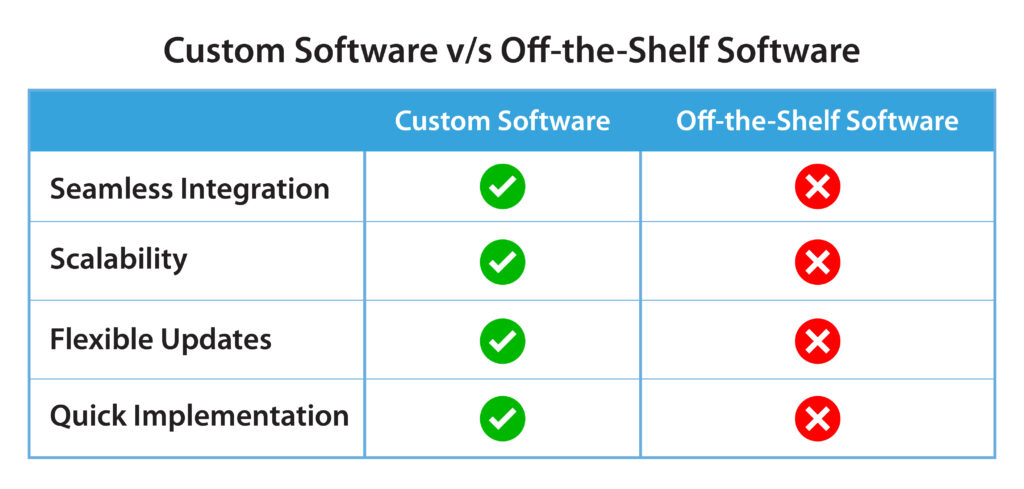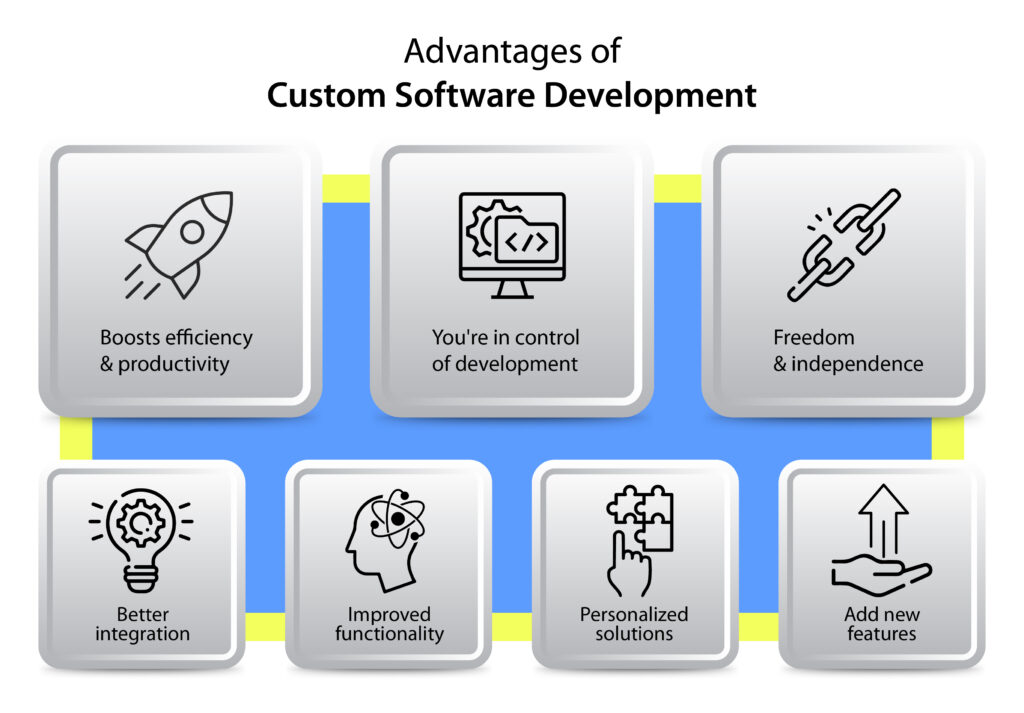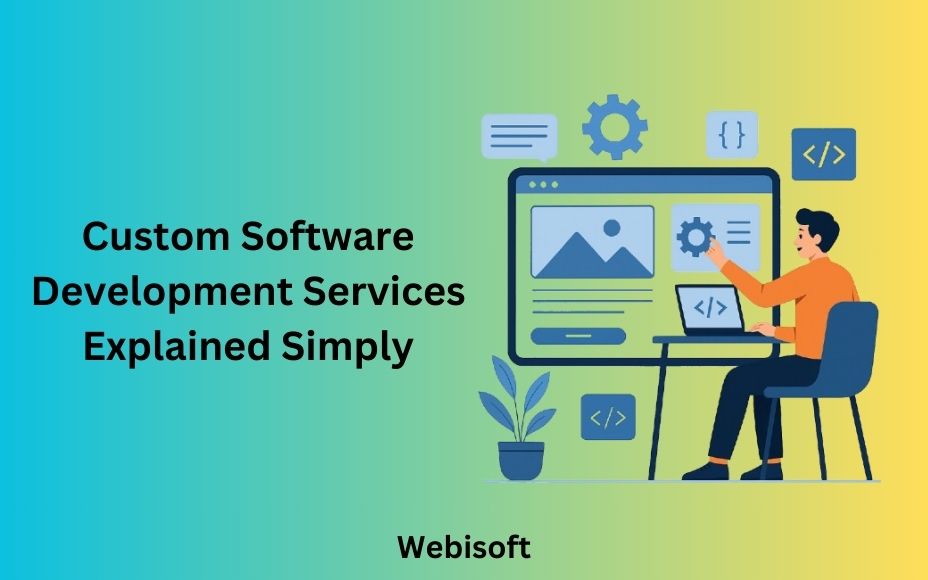In today’s rapidly evolving digital landscape, businesses are constantly seeking ways to stay competitive and meet their unique operational needs.
Custom software development has emerged as a powerful solution that offers tailored software solutions . Specifically it is designed to address specific business requirements.
This comprehensive blog aims to provide a thorough understanding of custom software development. Its advantages and drawbacks, and help businesses determine if it is the right fit for their needs.
Additionally, we will explore the world of software development services and highlight best practices for effective custom software development.
Contents
- 1 Understanding Custom Software vs. Off-The-Shelf Software
- 2 The key differences between the two lie in their features, flexibility, and scalability.
- 3 The Advantages of Custom Software Development
- 4 Exploring the Drawbacks of Custom Software Development
- 5 Is Custom Software the Right Fit for Your Company’s Needs?
- 6 Exploring the World of Software Development Services
- 7 Best Practices for Effective Custom Software Development
- 8 How Can Webisoft Help You With Custom Software Development
- 9 FAQs
- 10 Conclusion
Understanding Custom Software vs. Off-The-Shelf Software

Custom software, as the name implies, is software that is specially developed to meet the specific needs of a business or organization. This kind of software is typically designed and developed by a dedicated software development team.
On the other hand, off-the-shelf software is a pre-made software product that is available for purchase to the general public. It is designed to cater to the most common requirements of businesses in a specific category, such as accounting or customer relationship management.
The key differences between the two lie in their features, flexibility, and scalability.
Custom software is highly flexible and can be tailored to meet unique business requirements, whereas off-the-shelf software often has a fixed set of features and functionalities. Custom software is scalable and can grow with the business, whereas scalability with off-the-shelf software may be limited.
However, the decision between custom and off-the-shelf software isn’t always straightforward. It depends on factors such as
- The specific needs of the business
- The resources available for software development
- The timeline for deployment
- The long-term plans of the organization.
The Advantages of Custom Software Development

Custom software development offers several advantages, particularly in terms of cost and risk considerations. Here are the key advantages related to cost and risk in custom software development:
Cost Optimization
While the upfront custom software development cost of may be higher compared to off-the-shelf solutions, it provides long-term cost optimization.
With custom software, you only pay for the features and functionalities that are essential to your business, avoiding unnecessary expenses associated with licensing or implementing irrelevant features.
Additionally, custom software allows you to avoid ongoing subscription fees often associated with off-the-shelf software, resulting in potential cost savings over time.
Return on Investment (ROI)
Custom software development offers a higher potential for ROI. The software is tailored to your specific business requirements. It can deliver substantial benefits in terms of efficiency, productivity, and competitive advantage.
Custom software can optimize workflows, automate manual processes, and provide a seamless user experience, all of which contribute to increased operational efficiency and improved business outcomes.
The long-term ROI of custom software often outweighs the initial investment.
Scalability and Flexibility
Custom software allows for scalability and flexibility, ensuring that the software can grow and adapt alongside your business needs. As your business expands or encounters new challenges, custom software can be easily modified and enhanced to accommodate these changes.
This scalability and flexibility prevent the need for major software replacements or costly migrations in the future, saving you both time and money.
Risk Mitigation
Custom software development provides better risk mitigation compared to off-the-shelf solutions. With custom software, you have control over the development process.
It allows you to prioritize security measures and build a robust system that adheres to your organization’s specific requirements.
Custom software also reduces the risk of data breaches or cyber threats often associated with off-the-shelf software, as it is less susceptible to widely known vulnerabilities that can be exploited.
Ownership and Control
By investing in custom software development, you gain full ownership and control over the software. This means that you are not dependent on external vendors for updates, bug fixes, or support.
You have the freedom to make changes and enhancements as needed, ensuring that the software remains aligned with your evolving business needs. This ownership and control translate into reduced risk of vendor lock-in and greater control over the software’s roadmap.
Exploring the Drawbacks of Custom Software Development
Despite the advantages, custom software development also has potential drawbacks. These include higher upfront costs and longer development timelines compared to off-the-shelf software.
Custom software also requires ongoing maintenance and support, which can add to the total cost of ownership. There is also a degree of dependency on the development team for updates and upgrades, which may not be ideal for all organizations.
Additionally, managing software development projects can be complex and risky, particularly for businesses without prior experience in software development.
Is Custom Software the Right Fit for Your Company’s Needs?
Determining whether custom software is the right fit for your company’s needs requires careful consideration of several factors. Here are some key points to evaluate when making this decision:
Business Requirements
Assess your business’s unique requirements and challenges. Custom software development companies are most beneficial when your organization has specific workflows, processes, or functionalities that are not adequately addressed by off-the-shelf software.
Consider whether custom software can provide tailored solutions to improve efficiency, address pain points, and align with your business objectives.
Scalability and Future Growth
Consider your company’s growth plans and scalability requirements. Custom software can be designed to accommodate future expansion and evolving needs.
If your business anticipates significant growth or has complex requirements that may change over time, custom software provides the flexibility to adapt and scale alongside your organization.
Budget and Cost Considerations
Evaluate your budget and cost constraints. Custom software development costs typically involve higher upfront compared to off-the-shelf software.
Consider whether your budget allows for the investment in custom software, factoring in the potential long-term cost savings, return on investment, and competitive advantages that custom software can offer.
Time Constraints
Assess your time constraints and urgency. Custom software development projects require time for proper planning, development, and testing.
If your business has strict deadlines or immediate software requirements, off-the-shelf solutions may offer a faster implementation timeline.
However, it’s important to weigh the short-term time savings against the long-term benefits of custom software.
Unique Differentiation
Consider whether having a unique software solution is crucial for your business’s competitive advantage. Custom software enables you to differentiate yourself from competitors by incorporating specialized features, functionalities, or industry-specific capabilities.
If being distinctive in the market is essential to your business strategy, custom software can provide a significant edge.
Technical Expertise
Assess the availability of technical expertise within your organization. Custom software development requires skilled custom software developers, project management capabilities, and ongoing maintenance and support.
If you have an in-house team with the necessary expertise or the ability to partner with reliable software development service providers, custom software may be a viable option.
Risk Tolerance
It’s important for your company to fully understand your willingness to take on risks, especially when it comes to custom software development projects. These projects naturally come with some risks like possible delays, changing project scope, or technical issues.
Take time to think about how well your company can handle these risks. The better you can manage them, the more likely custom software will meet your business needs. Key factors to consider include:
- Future growth plans
- Your budget
- Project timeline
- Goals for setting your business apart
- Available technical skills
- How much risk you’re comfortable with
You should also consider getting advice from experts in software development. They can provide helpful insights and guidance that’s tailored to your company’s specific needs.
Exploring the World of Software Development Services
Software development services are integral to the process of creating custom software solutions. These services encompass several essential stages.
It ensures the successful development and deployment of software tailored to meet specific needs.
When choosing a development partner for a software project, it is vital to take into account various factors that can significantly impact the outcome of the project:
Consultation
A reliable development partner provides consultation services to understand the client’s requirements, goals, and challenges. This initial phase helps establish clear communication and ensures that the software aligns with the client’s vision.
Design
The development partner employs their expertise to create a well-thought-out design for the software. This includes creating a user interface (UI) and user experience (UX) design that enhances usability and meets the end-users expectations.
Development
The development partner leverages their technical skills and knowledge to bring the software design to life.
They use programming languages, frameworks, and tools to write and code the software, ensuring it functions as intended.
Testing
Thorough testing is crucial to identify and rectify any bugs, errors, or inconsistencies in the software.
The development partner conducts comprehensive testing to ensure the software is robust, reliable and meets the desired quality standards.
Support
A reliable development partner offers ongoing support after the software is deployed.
This includes addressing issues, providing updates, and implementing necessary enhancements or modifications to keep the software running smoothly.
When selecting a development partner, consider the following factors:
- Experience: Assess the partner’s experience in software development, particularly in projects similar to yours or within your industry. Experience indicates their familiarity with potential challenges and their ability to handle them effectively.
- Track record: Review the partner’s past projects, client testimonials, and case studies to evaluate their track record. This information provides insights into their ability to deliver high-quality software solutions within the specified timeframes.
- Range of services: Consider the breadth and depth of services offered by the development partner. Ensure that they can cover all the necessary aspects of the software development lifecycle, from initial consultation to post-deployment support.
By carefully evaluating these factors when selecting a development partner, you can enhance the chances of a successful software development project that meets your specific requirements and objectives.
Best Practices for Effective Custom Software Development
Effective custom software development involves several best practices. These include defining a clear vision and aligning it with business objectives.
It conducts thorough requirements analysis and planning, and embraces agile methodologies for flexibility and iterative development.
The user experience and user interface design should also be prioritized, as they significantly impact how end-users interact with the software.
A well-designed user interface can lead to better user adoption and efficiency, while a poor design can lead to confusion and decreased productivity.
Robust testing and quality assurance processes are also critical. Software testing helps to identify and fix bugs before the software is deployed, while quality assurance ensures that the software meets the required standards and business objectives.
How Can Webisoft Help You With Custom Software Development
At Webisoft, we have been designing, constructing, and deploying top-tier custom software solutions for over a decade. Our team is always at the forefront of the latest technology trends, whether SaaS, IoT, AI, blockchain, cloud, mobile, or web.
Our development team embodies the essential qualities – technical expertise, communication skills, and robust business acumen.
Defining Goals and Requirements
When you decide to develop a custom software application with us, our team will brainstorm, evaluate your business needs, and identify specific objectives.
We conduct comprehensive research to understand what’s best for your business and what strategies your competitors are employing. The Software Requirements Specifications (SRS) document compiles your needs and goals.
Choosing a Development Methodology
Given the complexity of software development projects, it’s crucial to select a specific software development methodology.
Our software developers primarily use an agile development methodology to create and manage custom enterprise applications in line with current trends and technology relevance. The agile approach allows for continuous enhancements to the software under development.
Comprehensive Documentation
Documentation is vital at all stages of implementation and development. It outlines what you currently possess and need. Software documentation can include a project plan, requirement specifications, Low-Level and High-Level Design, test reports, test plans, user documentation, and status reports.
These documents help track a project’s status and maintain an understanding of the software. In scenarios, the original development team is unavailable to upgrade the software. In this case, documentation is a reference for any new developer to understand the software’s structure quickly.
Simplicity in Coding
At Webisoft, we adhere to the principle of code simplicity, introduced by Max Kanat-Alexander, a developer at Google and Community. Code simplicity eliminates unnecessary complexity in software development.
Utilizing code simplicity and other software development principles, we design and develop robust, high-quality software for our clients.
End-to-End Testing
Our Test-Driven Development approach provides us with confidence in terms of code quality. Before integrating the new software into your entire business workflow, we thoroughly test it.
We never deliver software, assuming it will be bug-free after just one round of testing. Instead, we conduct multi-layer testing at every step of the software development and delivery process.
Code Coherence
Working as a team requires maintaining a consistent style for the code base. We utilize the latest and industry-acclaimed tools, such as Editorconfig, JSCS, and ESLint, to enforce a consistent manner within the code base.
Estimating Time and Budget
At Webisoft, we believe planning the budget and timeline before the development phase is crucial for successful custom software development. A realistic budget can prevent your software project from facing undue pressure.
The scope can expand quickly with agile methodology as the project progresses. On the contrary, a completely off-track estimate can compromise results and quality.
We maintain complete transparency with clients when creating budget estimates. On top of that we use smart, automated tools to draft the software development project estimates with the highest possible accuracy.
Code Reviews
Our team of quality test engineers conducts thorough code reviews to ensure excellent code quality. Code reviews help reduce bugs in the software, leading to successful custom software.
With these practices, we consistently succeed in building scalable and robust custom software applications.
FAQs
What are the qualities you should look into for custom software development?
Key factors to consider when selecting a software development team: expertise and experience, effective communication, problem-solving skills, and robust quality assurance practices.
What is the most important step while developing custom software?
The initial requirements gathering and analysis phase is crucial in custom software development as it sets the foundation for the entire project. It ensures a shared understanding between the client and the development team.
What are the 6 stages for software development procedure you need to know?
The 6 stages of software development: requirements gathering, design, development, testing, deployment, and maintenance/support.
How do you customize the development of software processes?
Options for customizing software development processes include adopting agile methodologies (e.g., Scrum or Kanban), modular development, prioritizing critical features, implementing continuous integration and deployment, and promoting collaborative decision-making.
Conclusion
In summary, the path to business enhancement is often paved with custom software development. This solution offers the dual advantage of meeting specific business needs while simultaneously giving organizations a competitive edge in today’s fast-paced market.
A thorough assessment of its merits and challenges allows companies to decide whether custom software aligns with their operational needs. Engaging seasoned professionals in software development and adhering to established best practices dramatically heightens the probability of success in this endeavor.
With meticulous planning and strategic implementation, custom software can serve as a powerful tool for driving efficiency, escalating productivity, and fueling growth in the constantly evolving business environment.
At Webisoft, we stand ready to partner with you on this exciting journey. Our expertise in custom software development can transform your unique business needs into innovative solutions. Reach out to us today to discover how we can help you harness the power of custom software and set your business on the path to success.
